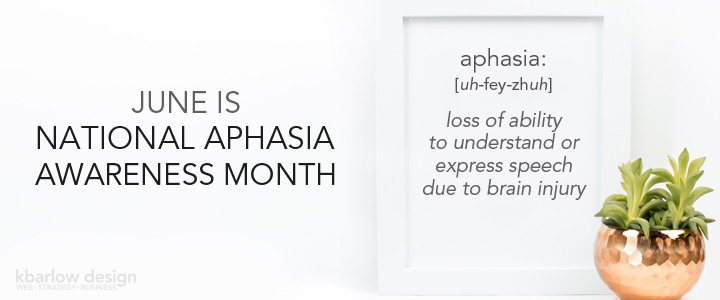June is National Aphasia Awareness Month – something that many people struggle with daily, but also something many people have never heard of.
Aphasia is a communication disorder that affects a person’s ability to process and use language. It affects people differently, from moderate to severe, and can affect being able to understand what people are saying, being able to express what they want to say, or both. It’s an acquired language disorder, usually due to stroke, brain injury or brain illness. It can affect a person’s ability to speak, understand, read and/or write. If you’d like to learn more about aphasia, there are tons of resources online, like this one.
The most important thing to know about people with aphasia – it is a loss of language, not intellect.
Our family has been through a lot in the past few years, and we’ve learned a lot about aphasia. The type we deal with in my family is both expressive and receptive. My Dad has trouble understanding what people are saying sometimes (although there has been a massive improvement over the years!), and sometimes struggles to find the words he wants to say. I often explain it to people by comparing it to a stutter. I find that helps people to realize that he’s still the same person, with all the same memories, education and experience, he just can’t spit them out the way he used to!
We use a lot of gestures in our family, often interrupting what we’re trying to say because we burst into laughter at some of the ways we use facial expressions, body movements and sounds to express ourselves in a way that he’ll understand the story we’re trying to tell (along with words). We laugh a lot! (And eventually we get the story across!) We’ve got some gestures that we’ve used for years that are staples that he recognizes easily, so we use them while talking as a secondary information source. Some days are better than others, and some days you’d never know there was any issue at all. He’s worked so hard to get better, and the change is incredible since 2012. We’ve learned what works best for him; for example to trigger a word he wants to say but can’t get out, we ask him to start to spell it. By the second or third letter, it will often release the word from his brain to his mouth and he’ll be able to say it. His favourite form of communication is written, so we write emails back and forth all day which keeps everyone up to date on what’s new, and makes it easy for him to understand.
If you’re trying to communicate with someone who’s struggling, offer different options:
- use gestures to offer to write something down (or pull out a pen and paper)
- speak clearly
- ask them how they prefer to communicate (if they can understand that)
- confirm they understand what you’ve said before you move on to the next thing
- and above all, be patient – they’re the same person they always were, just with a challenge in communicating what’s in their head.
Lots of programmes exist within Ontario for those with aphasia, and those that want to help by volunteering their time. You can find out what’s near you through a quick Google search, asking your doctor, or your local hospital for information.
Spread the word about aphasia, and hopefully it will help someone know what to do if they’re faced with a situation where they don’t know how to assist someone in communicating what they want/need.


